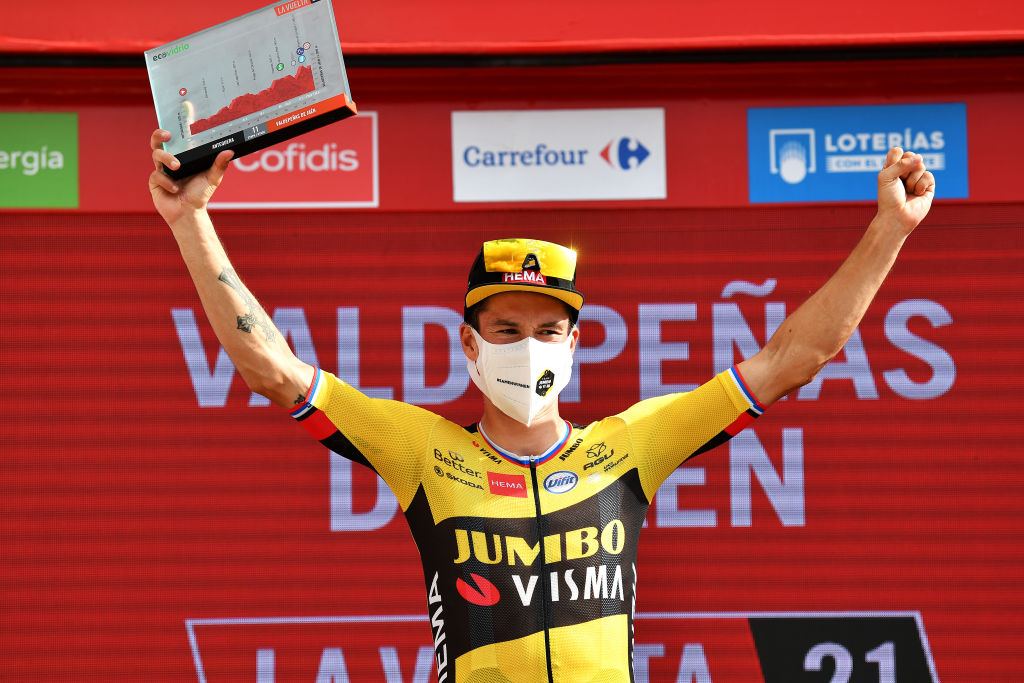Roglic puts downhill crash behind him for seventh Vuelta a España stage victory
Slovenian convinced that Bernal can get back into GC fight

Any brief doubts that Primož Roglič could have had a problem from his high-speed downhill crash on Tuesday evaporated in the scorching Andalucian sun on Wednesday as the Vuelta a España favourite claimed a stunning uphill victory at Valdepeñas de Jaén.
Roglic's win was taken in almost clinical style as the Jumbo-Visma racer followed his most dangerous rival, Enric Mas (Movistar) up the road in the final metres, then easily powered past him for the seventh Vuelta stage win of his career.
In the process, the double Vuelta a España champion also simultaneously put paid to any question marks over his condition after Tuesday's late crash, finished off some strong teamwork by his Jumbo-Visma squad, and stretched open his overall advantage by a few more seconds on the entire field.
But his second stage win in 10 days also underlined that, as the 2021 Vuelta moved into its second half on Wednesday, Roglič was in just as good condition, if not better, than he was in the first.
"It was a hard stage, super hot, and I think we were all quite tired entering the last climb," Roglič said, "and it was not a 'big science' at the end on the climb, just going a bloc. Luckily I had a little more at the end so I could win."
As for the brutally difficult uphill finish in Valdepeñas, won in the past by climbers of the calibre of Joaquim Rodriguez and Igor Anton, Roglič said that watching past finales had helped a little, but only up to a point.
"It's something on the video but then the reality is quite different when you do it. I didn't have a totally clear idea of how it was going to be, the end was super steep again.
Get The Leadout Newsletter
The latest race content, interviews, features, reviews and expert buying guides, direct to your inbox!
"But I still had something left and I just went for it in the end."
Crashes notwithstanding, Roglič has managed to distance his rivals for two days in a row, and it seemed almost irrelevant when he was asked whether he feared Mas or Miguel Ángel López (Movistar), second and third on the stage, respectively, and second and third overall too, the most.
"Everyone including myself: I'm also dangerous like yesterday," Roglič said with a laugh, presumably referring to the moment when he crashed, fortunately without consequences, on the downhill on Tuesday into Rincon de la Victoria.
"You cannot just point to one guy. Enric is obviously in good shape and he's also the most dangerous. That's why he's the closest. On the other hand, he has a teammate with López, and Ineos is still there. Many other guys, or more, are dangerous still. We have to go day by day and see how far we can come and what we can do."
Roglič underlined his point by agreeing that Egan Bernal (Ineos Grenadiers), again on the back foot on Wednesday, could yet come to the fore into the GC battle in the second half of the race.
"Definitely. It's still a super long race and the most decisive stages are still coming. So definitely he's good and he can surely come back."
Roglič also paid tribute to his team, thanking them for doing a "super job," and in the sunbaked sierras of eastern Andalucia, Jumbo-Visma were again very much in control of the race.
However, it's also true that be it on the longer slopes of Velefique on Sunday a second-category climb on Tuesday, or Wednesday's steep Mur de Huy-like ascent, Roglič's aggressive and versatile climbing style is giving him the edge on his rivals time and time again.
"It seems like you only have one strategy, attack and attack again," a Spanish journalist pointed out in the winner's press conference. "Would that be correct?"
"We'll see, you never know," Roglič responded. "Sometimes you [the media] say I never attack and yesterday [Tuesday] I did attack. But if I have the legs and shape, for sure I will try to do something again."
Alasdair Fotheringham has been reporting on cycling since 1991. He has covered every Tour de France since 1992 bar one, as well as numerous other bike races of all shapes and sizes, ranging from the Olympic Games in 2008 to the now sadly defunct Subida a Urkiola hill climb in Spain. As well as working for Cyclingnews, he has also written for The Independent, The Guardian, ProCycling, The Express and Reuters.
